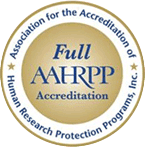POLICY
It is the policy of UTHealth to measure and improve compliance with human research protection policies and procedures and to measure and improve the effectiveness of the human research protection program. The IRB has the authority to request for random or ‘for cause’ study reviews of protocols under its oversight. The study review may include review of IRB processes and documentation, study site documentation, and observation of consent process and research.
PROCEDURE
HRPP Quality Improvement Activities – The UTHealth HRPP program has several projects to measure and improve the effectiveness of the HRPP. Some of the ongoing projects are:
- CPHS Faculty Report - A report of CPHS activities is shared with the research community annually. This report includes metrics on CPHS review timelines.
- CPHS Faculty Survey – All IRB outcome letters contain a link to an ongoing survey for researchers and research staff to give feedback about the IRB review process. Quarterly reports are submitted to the CPHS Executive Committee. An annual report of the faculty survey is included in the CPHS Faculty Report.
- CPHS Member Report – This report contains detailed metrics of the CPHS workload including number of agenda items at CPHS meetings.
These reports are reviewed annually at the CPHS Executive Committee meeting to identify areas for improvement. The CPHS Executive Committee CPHS retreats as educational an educational activity for IRB members and staff. . In addition to providing continuing education, at these retreats, ideas for improving effectiveness of HRPP is sought from CPHS members.
IRB Review – Research compliance staff conduct routine monitoring of IRB minutes to ensure compliance with policies and procedures.
Study Reviews – Research Compliance staff conduct routine post approval monitoring visits. The research compliance staff pick random studies from the iRIS system for routine monitoring. CPHS may request for a for cause audit at any time, including after the research is closed. Factors that may cause the CPHS to request an audit include, but are not limited to:
- Research involving vulnerable populations;
- Research involving recombinant DNA or gene transfer;
- Research conducted internationally;
- Use of waiver or alteration of informed consent procedures;
- Research for which subjects would be exposed to additional risks (e.g. breach of confidentiality, Phase 1 studies);
- Previous suspension of the research due to compliance issues;
- Recommendations from other institutional committees (chemical safety committee, biosafety committee);
- Research is suspended or terminated;
- Research has non-compliance issues;
- Research has several unanticipated problems involving risks to subjects or others ;
- Other situations where the IRB has concerns that warrants an audit.
The monitor will inform the Principal Investigator at least a week in advance of the upcoming review and set up an agreeable time for the review. The PI and the study staff should be available for questions, have documents accessible, and respond to any written requests within the time frame agreed with the monitor. Monitoring visits may be conducted in person or remotely.
The monitoring shall include, but not be limited to:
- Regulatory binder;
- Recruitment procedures and recruitment materials;
- Informed consent documentation and, if applicable, observation of the process;
- If deemed necessary, observation of research interactions or interventions with research participants;
- Verification from sources other than the PI that no unapproved changes have occurred since the previous review;
- Storage and use of investigational drugs and devices;
- All serious and unanticipated events have been reported to the CPHS as per Policy and Procedure Unanticipated Problems; and
- Other activities as deemed appropriate for a particular study.
The monitor will communicate preliminary findings to the Principal Investigator to facilitate understanding of the process and collaboration in resolving any outstanding issues/concerns at an exit interview that will occur after each compliance review.
The monitor will submit a report to the Principal Investigator. The PI will address and respond to the recommendation(s) suggested by the monitor within a timely manner. When the CPHS has requested a ‘for cause’ study review, the monitor will submit a copy of the report to the CPHS. The CPHS will review this at a convened meeting. Should the monitor discover an issue that potentially places participants at risk he/she will report the findings immediately to the IRB Director, Institutional Official or the Chairperson of the IRB responsible for the study. This will be handled as described in the policy and procedure on problem report.
APPLICABLE REGULATIONS
REFERENCES TO OTHER SOP
ATTACHMENTS
- Monitoring Checklist
- Monitoring Report Template
If you find errors in this document, contact [email protected]
|
Document Number: |
101-E05 |
|
Document Name: |
Compliance Oversight |
|
Reviewed by: |
Executive Director, Research Compliance |
|
Effective: |
1 Jan 2009 |
|
Revision History: |
1 Aug 2011, 21 Jan 2010, 1 Jun 2016, 1 Jun 2021 |
CPHS HELPLINE: 713-500-7943
iRIS HELPLINE: 713-500-7960
UTHealth Houston Compliance Hotline: 800-846-0632 (English & Spanish)
IRB OFFICE HOURS: Thursdays, 1–4pm via Teams Room
Committee for the Protection of Human Subjects
7000 Fannin St, Suite 1840Houston, Texas 77030
Phone: 713-500-7943
Fax: 713-500-7951
Email: [email protected]
Committee for the Protection of Human Subjects
IRIS Support: 713-500-7960
